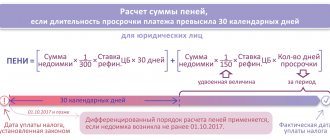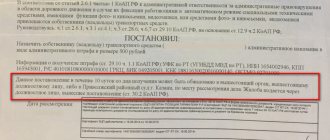When is a decision on an administrative offense made?
The first thing you need to know is that the decision is made either by a traffic police inspector or by a court. The deadlines for the issuance vary depending on the issuing authority and the time to study the materials in the case.
But in general, the timing is as follows:
- on the day of issue - if the IDPS recorded an offense with a sanction in the form of a fine or a warning to the driver, about which a decision is made right on the road (Part 1 of Article 29.11 of the Administrative Code),
- 15 days - a resolution on violations recorded on automatic recording cameras (Part 1 of Article 29.6 of the Code of Administrative Offenses of the Russian Federation), and fines are sent to drivers from the Automatic Recording Centers (TSAFAP), and in Moscow from the Traffic Management Center (TsODD),
- within two months - the court makes a decision after considering the case on the merits, on the basis of the protocol (part 1.1), then a copy of the decision is sent to the offender.
If the motorist does not agree with the violation charged to him, then the traffic police inspector still issues a decision. But in addition to it, he draws up a protocol on an administrative violation. Based on the protocol data, the driver has the opportunity to challenge the decision in the traffic police or in court.
Are there statutes of limitations?
Yes, I have. Moreover, in practice, the driver has the right to refer to the statute of limitations of bringing to administrative responsibility as an argument when appealing the decision.
An official or judge is required to comply with the statute of limitations for bringing car owners to justice. These deadlines are specified in Part 1 of Art. 4.5 of the Administrative Code, and they are not the longest:
- 3 months – if the administrative case is considered by a magistrate,
- 2 months – when the case is considered by another official or body.
The statute of limitations is always counted from the day the offense was committed. Not from the date of transfer to the court of the case materials from the traffic police, not from the date of their registration in the court office - namely, from the day when the IDPS recorded non-compliance with traffic rules on the part of the driver.
If the specified deadlines have expired, and the decision to bring the driver to administrative responsibility has not been made, the case is terminated due to the expiration of the statute of limitations. And it doesn’t matter that this same driver exceeded the speed limit by 30 km/h or ran a red light - he will not suffer any punishment.
Suppose you committed a violation on April 24, and the court issued a ruling only on July 30 - the 3-month period has expired, and they can no longer prosecute you. And if they try, then you have the right to appeal this decision as illegal, and refer to the expiration of the statute of limitations.
The prosecutor's office explains
Questions related to sending a message about employment in the case of registration of citizens who held positions in the state or municipal service as an individual entrepreneur
Federal Law dated July 1, 2021 N° 278-FZ amended the Federal Law “On the perpetuation of the Victory of the Soviet people in the Great Patriotic War of 1941-1945”
From 01/01/2022, changes to the Rules for establishing and paying an increase in the fixed payment to the insurance pension for persons who have worked for at least 30 calendar years in agriculture will come into force
New procedure for filling out and submitting a forest declaration
Responsibility for violation of the requirements of legislation on the protection of cultural heritage sites
Order of the Ministry of Construction of Russia dated May 14, 2021 No. 292/pr approved the Rules for the use of residential premises of state and municipal housing funds
The procedure for making a decision on the undesirability of foreign citizens and stateless persons staying on the territory of the Russian Federation
The Government, by Resolution No. 1464 dated September 1, 2021, approved the requirements for equipping a number of facilities with fire alarms and automatic fire extinguishing installations
In accordance with Order of the Ministry of Culture of Russia dated June 16, 2021 No. 981, the rules for serving disabled people in cinemas will change from March 1
On the provision of housing to orphans living in the Kirov region
Federal Law No. 67-FZ dated 04/05/2021 amended Article 140 of the Criminal Procedure Code of the Russian Federation, aimed at ensuring additional protection of the rights of citizens
Federal Law No. 59-FZ dated 04/05/2021 amended Article 354.1 of the Criminal Code of the Russian Federation and introduced criminal liability for public insult to the memory of defenders of the Fatherland
Federal Law dated 04/05/2021 N 86-FZ amended Articles 2 and 4 of Federal Law dated July 18, 2011 N 223-FZ “On the procurement of goods, works, services by certain types of legal entities”, according to which the obligation of customers is established...
Federal Law dated December 8, 2020 N 429-FZ amended Article 1 of Federal Law dated December 26, 2008 N 294-FZ “On the protection of the rights of legal entities and individual entrepreneurs in the exercise of state control (supervision)…
Rules on labor protection in agriculture have been approved
Criminal liability for intentional destruction or damage to property
Recruitment notice for former government employee?
From what period is a person considered to be brought to administrative responsibility?
Distinguishing between theft and discovery
If the terms of payment of wages or other payments are violated, the employer is obliged to pay them with interest.
Right to file a civil claim in a criminal case
Victims in private prosecution cases
Victims in private prosecution cases
Consideration of applications and reports of crimes
Procedure for refunding overpaid tax
The procedure for collecting alimony for minor children
Responsibility for failure to comply with punishment in the form of correctional labor
Features of hiring minors
On liability for insulting a government official
On certain provisions providing for the suspension of the accrual of penalties for late payment of housing and communal services
On special social payments to employees of medical organizations providing medical assistance for the diagnosis and treatment of COVID-19
New police powers from 1 January 2021
Preferential categories of citizens are given the opportunity to remotely issue travel documents via the Internet
Exclusion of individual entrepreneurs from the Unified State Register of Individual Entrepreneurs
The legislation provides for the possibility of blocking subscriber telephone numbers of convicted persons and persons held in pre-trial detention centers
State support for the rights of people with disabilities
Grounds and procedure for assigning and making monthly payments in connection with the birth (adoption) of the first child and (or) monthly payments in connection with the birth (adoption) of the second child
Amendments have been made to the Code of Administrative Offenses of the Russian Federation aimed at protecting the interests of small and medium-sized businesses
Administrative responsibility provided for in Art. 20.3.1 Code of Administrative Offenses of the Russian Federation (incitement to hatred or enmity, as well as humiliation of human dignity)
News 1 - 39 of 39 Home |
Prev. | 1
| Track. | End | All
How long does it take to serve a decree on the offending driver?
It is impossible to give exact dates. After all, a decision with a fine is a postal item that must still reach the place of registration of the addressee. And in this case, it is very difficult to predict the timing, since the third link is the Russian Post.
As soon as the resolution is ready, it is drawn up in the form of a registered letter and sent to the known address of the offender - the law allots 3 days for this (Part 2 of Article 29.11 of the Code). Further, everything depends on the speed of the Russian Post. In practice, “chain letters” can arrive 2-4 weeks after the decisions are made. Alas, neither the traffic police nor ordinary drivers can influence the delivery in any way.
The post office stores letters from the traffic police and courts for 7 days - is this true?
Yes its true!
The corresponding changes came into force on March 31, 2021 by Order of the Ministry of Digital Development of Russia No. 619. For comparison, previously the storage period for correspondence from the traffic police was 30 days. The drivers tried to stretch out the consideration of the case as long as possible, so they took the letters on the 29th-30th day of storage, and then appealed the fine on the 10th day. In 2021, letters from the traffic police and courts will take much less time to be delivered to recipients by post - only 7 days.
And if you do not pick up such a “chain letter” within the allotted time for storage, it will be returned to the sender - but the fine will come into force. There are far fewer loopholes for delaying deadlines.
How much time is given to a driver to appeal a ruling in 2021?
10 days.
It is within 10 days that you can file a complaint against the issued fine. The countdown of the period is the day when you were served with this decision (Part 1 of Article 30.3 of the Code of Administrative Offenses). And in practice there are several ways:
- the decision is issued by the IDPS on the road - the start date of the 10-day period for appealing the fine is the day the driver is given a copy of such a decision from the hands of a police officer,
- the fine came from an automatic recording camera - the date is counted from the receipt of the “chain letter” in the correspondence receipt window at the post office/box.
A complaint against the decision can be filed in any convenient way: in person to the traffic police, TsAFAP or through the court - by registered mail, and from September 1, 2021, through the State Services portal.
How to calculate 10 days for an appeal?
So, we found out that the 10-day period is counted from the date of receipt of a copy of the decision on the administrative offense. But in practice, many drivers face the difficulty of calculating deadlines. In fact, there is nothing complicated.
Let's look at an example of calculating the 10-day period for appealing a traffic police fine:
On August 23, you did not let a pedestrian pass and the violation did not escape the attention of the traffic police inspector. He drew up a resolution on the offense under Art. 12.18 of the Code of Administrative Offenses of the Russian Federation, and imposed a fine of 1,500 rubles on you. A copy of the resolution was handed to you on the same day - August 23. The countdown of the ten-day period for appealing the fine will begin only from the next day, that is, from August 24 (Part 1 of Article 4.8 of the Administrative Code). The deadline for filing a protest will be September 2. And already on the 3rd, another deadline will begin for you - to pay the administrative fine.
Often the last day of the ten-day period falls on a Saturday or Sunday - these are non-working days. In such cases, the last day of the period will be Monday (the nearest working day). That is, on Monday you will still be able to file a complaint against the decision, but on Tuesday you will not be able to.
I missed the deadline for appealing the decision - can it be restored?
Yes, but only if you have good reasons.
The task is to file a petition to restore the missed deadline for appealing an administrative fine (Part 2 of Article 30.3 of the Administrative Code). The appeal will be considered either by a judge or a traffic police officer, depending on who initially made the decision about your offense.
But petition alone will not be enough. There must also be good reasons. Each of them will have to be justified:
- if you were sick and physically could not file a complaint, attach an extract from your outpatient card, a doctor’s report, and other medical documents,
- if you have not received any resolution - postal notifications,
- if you were on a business trip or abroad - an order from your superiors to send you on a business trip, copies of railway and air tickets, vouchers, border crossing documents, etc.
Practice shows that the traffic police and the courts accommodate drivers halfway if they missed the deadline for objective and valid reasons. Forgetfulness, problems with mathematics and natural laziness - alas, will not work.
Article 4.6. The period during which a person is considered subject to administrative punishment
Resolution of the Supreme Court of the Russian Federation dated January 17, 2019 N 16-AD18-8 By virtue of Article 4.6 of the Code of the Russian Federation on Administrative Offenses, a person who has been assigned an administrative penalty for committing an administrative offense is considered subject to this punishment from the date the resolution imposing an administrative penalty comes into force before the expiration of one year from the date of completion of execution of this resolution.
Resolution of the Supreme Court of the Russian Federation dated June 20, 2019 N 25-AD19-3
Article 4.6 of the Code of the Russian Federation on Administrative Offenses determines that a person who has been assigned an administrative penalty for committing an administrative offense is considered subject to this punishment from the date the resolution imposing an administrative penalty enters into legal force until the expiration of one year from the date of completion of the execution of this resolution.
Resolution of the Supreme Court of the Russian Federation dated August 1, 2019 N 82-AD19-5
Article 4.6 of the Code of the Russian Federation on Administrative Offenses determines that a person who has been assigned an administrative penalty for committing an administrative offense is considered subject to this punishment from the date the resolution imposing an administrative penalty enters into legal force until the expiration of one year from the date of completion of the execution of this resolution.
Resolution of the Supreme Court of the Russian Federation dated August 1, 2019 N 29-AD19-5
By virtue of Article 4.6 of the Code of the Russian Federation on Administrative Offenses, a person who has been assigned an administrative penalty for committing an administrative offense is considered subject to this punishment from the date the resolution on the imposition of an administrative penalty enters into legal force until the expiration of one year from the date of completion of the execution of this resolution.
Ruling of the Supreme Court of the Russian Federation dated September 6, 2019 N 307-ES19-14886 in case N A56-96704/2018
Agreeing with the conclusions of the courts on the existence of an offense, the district court pointed out that for the purpose of applying the exclusive preference provided for in Article 4.1.1 of the Code of the Russian Federation on Administrative Offenses, the legal significance is not the absence of repeated commission of an administrative offense (within the meaning of Articles 4.3 and 4.6 of the Code Russian Federation on administrative offenses), namely the commission of an offense for the first time. Such circumstances were not established by the courts when considering the case.
Resolution of the Supreme Court of the Russian Federation dated December 18, 2019 N 19-AD19-9
Article 4.6 of the Code of the Russian Federation on Administrative Offenses determines that a person who has been assigned an administrative penalty for committing an administrative offense is considered subject to this punishment from the date the resolution imposing an administrative penalty enters into legal force until the expiration of one year from the date of completion of the execution of this resolution.
Ruling of the Supreme Court of the Russian Federation dated June 20, 2017 N 306-AD17-7339 in case N A55-18207/2016
Changing the decision of the court of first instance in terms of sentencing, the appellate court proceeded from the fact that the commission of a violation by the arbitration manager, expressed in the failure to hold a meeting of creditors at the request of the authorized body, within the period during which, according to Article 4.6 of the Code of Administrative Offenses of the Russian Federation, he was considered subject to administrative punishment, is a circumstance aggravating administrative liability by virtue of clause 2 of part 1 of article 4.3 of the Code of Administrative Offenses of the Russian Federation. The district court, upholding the appeal court's ruling, upheld these findings.
Ruling of the Supreme Court of the Russian Federation dated September 8, 2017 N 310-AD17-12055 in case N A23-6107/2016
The administrative punishment was imposed by the courts within the sanction of Part 3 of Article 14.13 of the Code of Administrative Offenses of the Russian Federation, taking into account the provisions of Articles 3.4, 4.1, 4.6 of the Code of Administrative Offenses of the Russian Federation. When considering the case, the courts took into account the ruling of the Arbitration Court of the Kaluga Region dated July 12, 2016, by which Kashirin V.P. suspended from the duties of the bankruptcy trustee of Vitas-Vitalis LLC in connection with his violations of the requirements of the Bankruptcy Law.
Determination of the Judicial Collegium for Criminal Cases of the Supreme Court of the Russian Federation dated 01/09/2019 N 63-UDP18-3
Please note that when deciding whether the driver’s actions constitute a crime under Art. 264.1 of the Criminal Code of the Russian Federation, it is not the fact that he committed an administrative offense provided for in Part 1 or Part 3 of Art. 12.8 of the Code of Administrative Offenses of the Russian Federation, but the fact that he is being punished for such an offense. By virtue of Art. 4.6 of the Code of Administrative Offenses of the Russian Federation, a person is considered subject to administrative punishment from the date the resolution imposing an administrative penalty enters into legal force until the expiration of one year from the date of completion of the execution of this resolution.
Resolution of the Supreme Court of the Russian Federation dated December 11, 2019 N 44-AD19-51
As can be seen from the case materials, Shardakov R.E. homogeneous offenses were repeatedly committed within the period established by Article 4.6 of the Code of the Russian Federation on Administrative Offences. Thus, the administrative punishment imposed by the magistrate is justified and fair. There were no violations of the norms of procedural law during the proceedings on the case of an administrative offense; the norms of substantive law were applied correctly.
Ruling of the Supreme Court of the Russian Federation dated April 29, 2019 N 305-ES19-4401 in case N A40-51529/2018
In canceling the judicial acts adopted in the case, the cassation court, guided by the provisions of Articles 4.3, 4.6 of the Code of Administrative Offenses of the Russian Federation, proceeded from the fact that at the time the company committed the administrative offense imposed by the contested administrative decision, the company was considered subject to administrative punishment for committing a similar offense. At the same time, the previously issued resolution, which the administrative body referred to when holding the company accountable again, entered into legal force.
How long should I wait for a response to a complaint from TsAFAP, the traffic police and the court?
The answer to this question is given to us by the first and second parts of Article 30.5 of the Code of Administrative Offenses of the Russian Federation:
- 10 days – upon consideration by the traffic police,
- 2 months – by the district court.
What's next? And then, as soon as your complaint is examined, the authorized body or judge makes a decision. It can either be in your favor or not in your favor. For example, the fine may be canceled completely, your punishment may be reduced, or everything may be left unchanged. After the verdict is rendered, you will be informed about it in writing - a copy of the decision will be sent to your address within 3 days from the date of delivery (Part 2 of Article 30.8 of the Code of Administrative Offenses of the Russian Federation).
Then you again have a choice of what to do next - agree with the decision on the complaint against the fine or continue challenging the punishment, but in higher authorities (appeal, cassation and the Supreme Court).
How long does it take to pay a traffic fine?
Offenders are given exactly 60 days to fully pay the traffic fine. Together with 10 days to appeal the decision, the total period is 70 days.
If you do not meet the specified period and do not make payment, the fine will be considered overdue. There is nothing good for the driver in this situation, but we will return to this later.
Is it possible to pay with a discount?
Yes. Administrative fines in the field of traffic can be paid with a discount of 50% of the fine amount. This opportunity is provided by Part 1.3 of Art. 32.2 Code of Administrative Offenses of the Russian Federation. However, the same part provides a list of fines that are not subject to the discount. For example, for illegal parking on the lawn, drunk driving or repeatedly running a red light - for these and a number of other traffic violations, the driver will have to pay the fine in full.
A 50% discount on payment of a traffic police fine is available only within 20 days from the date of the decision on the violation. Yes Yes! The starting date is the day the decision was made by the IDPS or the court, and not the date of delivery of a copy of this decision to the violating person. And this is a minus for drivers!
But I received a copy of the resolution later than 20 days - will the discount expire?
Yes, the original benefit will expire.
But this does not mean that the driver will have to pay the full, rather than half, amount of the traffic police fine. No one has canceled equality before the law! This, in particular, was indicated by the Constitutional Court in Resolution No. 35-P of December 4, 2017, from whose submission changes were made to Art. 32.2 Code of Administrative Offenses of the Russian Federation.
Now part 1 of this article reads like this:
If a copy of the decision imposing an administrative fine, sent to a person held administratively liable by registered mail, was received at his address after the expiration of twenty days from the date of such decision, this period is subject to restoration by the judge, body, official, who made such a decision, at the request of a person brought to administrative responsibility.
What's important here? When a “chain letter” arrives to you late due to the fault of the postal service, as a result of which you missed the 20-day deadline for paying the fine with a discount, this deadline can be restored. To do this, you have the right to file a petition with a corresponding request.
How to restore the missed deadline for paying a fine at a discount?
Without filing a petition, the missed deadline for paying the fine will not be restored to you with a 50% discount. It is not automatically extended in 2021 - the traffic police do not track when the letter with the resolution was delivered to the addressee, this is not their job. Therefore, to restore the deadline, you will need a number of simple manipulations.
Briefly, the procedure looks like this:
- You receive a “chain letter” that the post office delivered late, and through no fault of your own you missed the deadline to pay a fine with a discount.
- You file a petition asking to reinstate the missed deadline. There is nothing complicated - especially since the appeal can be written in free form.
- Please attach to your application evidence of late delivery of the letter by Russian Post:
- notification from the post office about a registered letter (with date),
- an envelope with a stamp with the date the correspondence was received by mail or delivered to the addressee.
- You send your petition to the authority that issued the decision. The name, full name of the official and the exact address of the body can be found in the resolution itself. Send by a valuable letter with a list of attachments and a receipt confirmation - this way you will have proof of sending the application to the authorized body. The issue price is 113 rubles.
In practice, within 1-2 days an official reviews the appeal and makes a decision. If the request is granted, your 20-day period for paying the fine will be restored with a 50% discount. Then all that remains is to make the payment and pay off the outstanding fine.
Advice! In order not to miss a discount, it is better to track chain letters in official electronic sources. The easiest way to monitor fines is on the traffic police website. The same opportunity is implemented on the State Services portal. Moscow residents can track traffic police fines on the mos.ru portal. In addition, there are now many mobile applications with the function of delivering notifications from government agencies.
The Constitutional Court clarified the timing of administrative violations
The Constitutional Court checked for compliance with the Basic Law of Art. 4.6 of the Administrative Code, which establishes the period during which a person is considered subject to administrative punishment, and Part 1.3 of Art. 32.2 of the Administrative Code, which regulates the possibility of paying an administrative fine in half the amount within 20 days from the date of the decision to impose it.
The reason for the inspection was a request from the Kostroma Regional Court, which was looking into a dispute between a local resident and the traffic police. On July 6, 2021, the woman was fined 1,000 rubles. for speeding, after a week she paid half the fine. On August 8, 2021, the owner of the car again exceeded the speed limit. She was prosecuted for repeated violation and fined 2,000 rubles.
- Hit a stop line: when can you appeal a fine
June 9, 10:56 - Speeding fine: canceled in court
April 28, 10:30
The woman went to court to reclassify the act. She insisted that more than a year had passed from the date of payment of the first fine to the day the second administrative offense was committed, therefore, the period during which the person was considered subject to administrative punishment had passed. The Ostrovsky District Court of the Kostroma Region upheld the complaint, reclassified the act and reduced the fine from 2,000 to 1,000 rubles.
However, the traffic police did not agree with this, and appealed the decision of the first instance to the Kostroma Regional Court. The Inspectorate proceeded from the fact that the period during which a person is considered subject to administrative punishment depends on the date of entry into force of the decision on his appointment, and not on the time when the execution of this decision is considered completed. The Kostroma Regional Court turned to the Constitutional Court for clarification.
The presence of two alternative, but not unfounded, options for interpreting the provisions of Art. 4.6 of the Code of Administrative Offenses and Part 1.3 of Art. 32.2 of the Code of Administrative Offenses is not consistent with the principle of legal certainty and creates the danger of unlimited discretion in the process of law enforcement, the Constitutional Court considered.
At the same time, limiting the period of administrative punishment to a year from the date of payment of the administrative fine is more in the interests of the perpetrator, since it actually reduces the period during which the commission of a new homogeneous offense will entail the application of increased liability.
“This interpretation will enhance the stimulating effect of Part 1.3 of Art. 32.2 of the Code of Administrative Offenses and act as another advantage - along with the opportunity to pay the fine not in full, but in half - for persons held accountable for administrative offenses in the field of road traffic,” says the Constitutional Court Resolution No. 28- dated June 23, 2021 P.
The Constitutional Court recognized that the contested norms do not comply with the Basic Law and ordered the legislator to make appropriate amendments to the Code of Administrative Offences. Prior to this, for persons who paid a fine in half the amount, the period of administrative liability ends after a year from the date of payment of the fine, and not from the date of entry into force of the decision on its imposition, the Constitutional Court indicated.
- Kira Klimacheva
- constitutional Court
What is the penalty for delaying a traffic police fine in 2021?
The fine becomes overdue, and the debtor faces serious sanctions.
How does this happen in practice? Initially, you are given exactly 70 days to pay the fine, of which 10 days to appeal the decision and 60 days to pay the fine itself. On the 71st day from the moment you receive a copy of the decision, the fine becomes overdue.
For those who did not pay the traffic police fine on time in 2021, liability is provided for evading the execution of an administrative penalty under Part 1 of Art. 20.25 of the Code of Administrative Offences, where sanctions include:
- doubling the original (unpaid) fine - but not less than 1,000 rubles,
- compulsory work up to 50 hours,
- administrative arrest for up to 15 days.
Only the judge is authorized to make the final decision on punishment. At the same time, even if the driver faces arrest for evading a fine, traffic police officers cannot detain the car owner on the road and forcibly take him to court. This should be the case in theory. But in practice this happens, and quite often. That is, you, as an overdue fine, can be taken to the traffic police department. Or they can go directly to the magistrate’s court, where on the same day the judge will consider the case and hand down one of the punishments. If this is an arrest, then you will be taken directly from the courtroom to a special detention center.
How long can they be held accountable?
Only 3 months are allotted to attract a driver for an overdue fine - by virtue of Part 1 of Art. 4.5 Code of Administrative Offences.
The deadline is counted from the first day of non-payment, that is, on the 71st day after delivery of the IDPS decision or receipt of a “chain letter” by mail. To determine the statute of limitations, add exactly 3 months to this period.
Legal regulation of statute of limitations in administrative cases
The main legislative act that regulates the concept of statutes of limitations and their application in relation to administrative offenses is the Code of Administrative Offenses of the Russian Federation itself. In particular, the issues of applying statutes of limitations in administrative proceedings are considered specifically by the provisions of Art. 4.5 Code of Administrative Offenses of the Russian Federation. This article reveals a comprehensive general procedure for applying statutes of limitations to administrative offenses, and also provides a complete list of situations in which a special procedure for considering cases and calculating statutes of limitations for them can be applied.
note
The concept of statute of limitations, as well as the practice of their application in administrative proceedings, is much simpler and often used in comparison with criminal cases. This is ensured by the absence of public danger in administrative offenses and, as a consequence, the smaller size of possible punishments in most cases.
In general, according to the provisions of the above-mentioned article of the Code of Administrative Offenses, the statute of limitations for cases concerning administrative offenses in general cases is two months from the date of commission of such a punishable act. If the issue of the existence of an administrative offense must be resolved directly by the judge, then the statute of limitations is calculated as three months from the date of the commission of the offense.
Important fact
It is necessary to distinguish between the concept of statute of limitations, which applies to an offense for which a punishment has not yet been imposed with the validity period of the administrative punishment.









